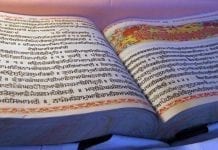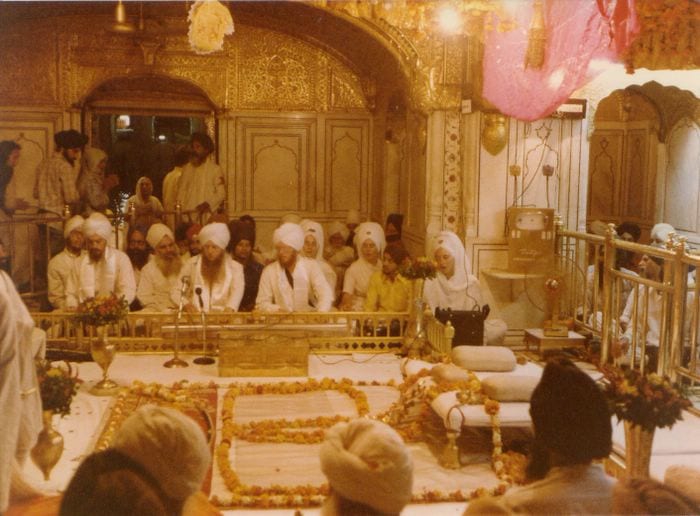ਥਾਲ (thaal)
Meaning: noun: Dish, platter.
Quote:
ਥਾਲ ਵਿਚਿ ਤਿੰਨਿ ਵਸਤੂ ਪਈਓ ਸਤੁ ਸੰਤੋਖੁ ਵੀਚਾਰੋ॥
thaal vich tiňn vastoo pa-ee-o sat saňtokh veechaaro.
Upon the divine platter (of Guru Granth Sahib), three valuable things have been placed: truthful conduct, contentment and contemplation. -Guru Arjan Sahib, Guru Granth Sahib, 1429
Message: Guru Granth Sahib is a large platter of spiritual food. It contains three delicious dishes or values: namely truthful living, a state of inner satisfaction and deep reflection.
The nourishment of the mind is essential for spiritual enlightenment and growth. Day after day, we need to partake of this food and relish it.
If we regularly read, reflect, and act on the lessons learnt, we realise that all creation is an expanse of the Divine. We learn to live in harmony with the will of the Divine and will thus obtain nirvana on this earth.
Notes: This verse is from the closing hymn in Guru Granth Sahib followed by a couplet which is an expression of gratitude to the Divine for help in completing the enormous task of compilation. Ragmala is as an appendix.
Etymology: From Sanskrit sthaal (earthen dish) → Pali thaal (dish, plate) → Prakrit thaal → Kashmiri thaal (metal platter), Sindhi thaalu and Punjabi/Lahndi thaal.
Summary of the Week:
Guru Granth Sahib is probably the only Scripture that was written by the Gurus themselves. The compositions were handed over to the successive Gurus who kept adding their writings to the compositions of their predecessors and including other contributors until these were compiled into Pothi Sahib or Adi Granth by the fifth Guru.
Sikhs might not have survived and prospered through many adversities and genocides without their firm faith and application of the wisdom enshrined in Guru Granth Sahib.
Guru Granth Sahib is the Gurus’ greatest gift to humankind. Engaging with its wisdom enables us to seek solutions to the multiple challenges we face in modern society. It is as relevant today as it was more than 500 years ago.
This can be done by overcoming duality within our lives and creating a dignified, just and open-minded society based on holistic understanding, love and compassion – the central mission of the Gurus.
Notes: Certain collections of hymns exist in other volumes (known as Mohan Pothis or Goindwal Pothis or Ahiyapur Vali Pothis) and some scholars believed that they are the sources from which the first version of Guru Granth Sahib was compiled.
However, these sources have been examined by some prominent Sikh scholars and they have verified that their inferences are at variance with the above beliefs. The story of these volumes being the source for compilation of Guru Granth Sahib also fails the touchstone of Gurbani.
For example, it is claimed that these volumes were written under the supervision of the third Guru, however, they also contain some hymns of the fourth and the fifth Gurus. Some hymns of the first and third Gurus have been shown as those of the fourth and fifth Gurus. This shows that they represent later collections and could not have been the source for compiling the first version of Guru Granth Sahib.
In fact, the descendants of Baba Mohan, the elder son of Guru Amar Das (who didn’t acknowledge Guru Ram Das as the fourth Guru) wanted to project Baba Mohan as the guru and that they are the custodians of Gurbani. Many scholars mistakenly believe this concocted story.
The definitive view is that the compositions, including the collection of Bhagats and Bhatts, were passed down the line, from the first to the fifth Guru by the successive Gurus themselves. Passing on of the compositions was considered the sign of anointment or guruship.
The work of Prof Pritam Singh, an eminent Sikh scholar and an expert on “Ahiyapur Vali Pothi,” is quite significant in separating the Bani of Guru Granth Sahib and various spurious writings attributed to the Sikh Gurus. He proved that Guru Arjan never used Goindwal or Ahiyapur Vali Pothi for the preparation or as a source for Guru Granth Sahib in 1604.
For further reading, please see this article in English here or here.
To read more about the compilation of Guru Granth Sahib read this book in English, here.
Or, read these books in Punjabi:
- Sikhan Di Bhagatmala by S S Padam
- Ahiyapur Vali Pothi Part-I by Prof. Pritam Singh




